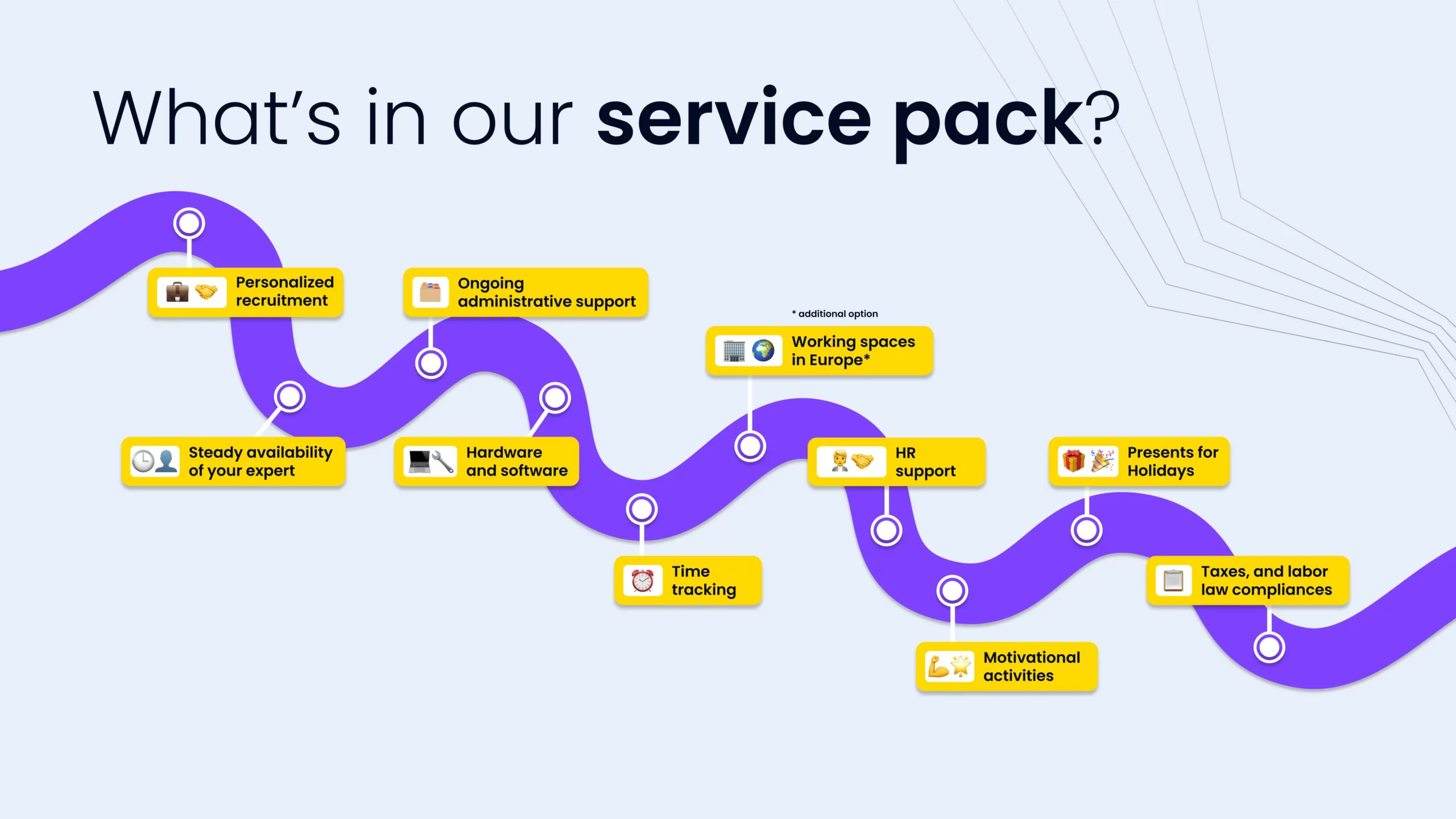
DevOps is an acronym for development and operations. It is a set of practices designed to revitalize the interaction of developers with IT service professionals and bring their work processes closer together. The basic idea is a close interdependence between the development and use of software. DevOps methodology aims to help companies create and update software products and services faster.
Content:
- The history of DevOps methodology
- Why does your business need DevOps?
- What are the alternatives to DevOps?
- How much do DevOps specialists make?
- Can you delegate DevOps services?
- DevOps staffing with MWDN
The history of DevOps methodology
You might think that the notion of DevOps is quite new. Partially, it’s because it took a great leap forward in 2009 after the first-ever DevOps conference that took place in Belgium. Before that, however, there was also DevOps, but it just wasn’t called so.
The idea of blending software development with deployment and operations started in the late ’80s and early ’90s. People realized that building software in isolation from the teams deploying and maintaining it wasn’t the best idea.
By 2007–2008, this disconnect was causing real frustration in the software and IT communities. Developers would write the code, throw it over the wall to operations, and then blame each other when things broke. It wasn’t working.
In 2009, a Belgian consultant and Agile expert, Patrick Debois, started the first DevOps event. It was about finding better ways for developers and operations teams to work together. That little conference grew fast and is now a global movement.
In 2012, the first “State of DevOps” report came out. This annual report quickly became the go-to resource for understanding where DevOps was headed. In 2016, the DORA metrics (from DevOps Research and Assessment) showed up in the State of DevOps report. These metrics focused on things like how often teams deploy code, how long changes take to roll out, and how quickly they fix problems when something goes wrong. Over the years, the metrics were fine-tuned, like in 2023, when “mean time to recover” was renamed “failed deployment recovery time” to make it clearer.

Another key moment in DevOps history was the rise of infrastructure as code and tools like Chef, Puppet, and later, Ansible and Terraform, which automate a lot of the manual work in operations, facilitating the teams’ collaboration.
Cloud computing also gave DevOps a huge boost. AWS, Azure, and Google Cloud simplified the systems scale and code deployment, something that fits perfectly with DevOps principles.
Why does your business need DevOps?
When it comes to practical needs, especially for businesses, DevOps can be useful for companies that require frequent software releases, as the daily release cycle can be much more intense for companies that release multiple applications across multiple disciplines.
DevOps methodology focuses on standardizing development environments to provide rapid release readiness. Ideally, developers should have access to and control over build and release automation systems in each environment, and the IT infrastructure should be as focused as possible on the application.
The goal of DevOps is to align the development and delivery of software with its use. This task is often accomplished through automated means.
What are the alternatives to DevOps?
DevOps is the most popular methodology at the moment, but here are some honorable mentions. Some alternatives (like SRE, GitOps, and Platform Engineering) are genuinely popular and growing, especially in modern tech, while things like NoOps or Agile + Traditional IT are niche or transitional. Here’s more:
- NoOps is more of a buzzword and not a widely implemented methodology. It works best in limited cases like startups heavily using serverless computing or fully managed cloud services. It is very niche, mostly popular among cloud-first or small teams.
- GitOps gains some popularity, especially among Kubernetes users and cloud-native companies. It becomes more widely used because it simplifies managing infrastructure-as-code and deployments. Overall, it is fairly popular in DevOps-savvy environments.
- Platform Engineering is a growing trend, especially in mid-to-large tech companies. For example, Spotify and Netflix are said to be using it.
- SRE is very influential. Site Reliability Engineering started at Google and has spread to others who prioritize system reliability, like LinkedIn and Airbnb. It is quite popular among large-scale and cloud-native companies.
- Agile + Traditional IT is an existing combo, but it’s more of a stopgap than a long-term solution. Companies transitioning from legacy systems often end up here. It is common in industries with strict compliance needs, like finance or healthcare.
- ITIL is widely used in industries that need strict process management, like banking and government. IT Infrastructure Library, though, is seen as “old school” compared to DevOps, which loses ground to more agile approaches.
- Ad-hoc is a usable methodology for small startups or informal teams. It’s often how companies start before adopting structured methodologies. It is common and popular among early-stage startups or small teams with basic needs.
How much do DevOps specialists make?
To understand why the numbers are that high, let’s start with the key requirements for DevOps engineers. They are expected to have a mix of technical skills, soft skills, and a good understanding of both development and operations.
Here are some demands for the DevOps role in most companies:

- Strong foundation in System Administration, like solid knowledge of Linux/Unix systems, Windows, and networking basics.
- Scripting and automation skills. Namely proficiency in Python, Bash, or PowerShell.
- Experience with CI/CD pipelines and hands-on experience with Jenkins, GitLab CI/CD, CircleCI, or GitHub Actions.
- Familiarity with Terraform, Ansible, or AWS CloudFormation to create Infrastructure as Code (IaC).
- Deep understanding of AWS, Azure, or Google Cloud.
- Proficiency in Docker and orchestration tools like Kubernetes.
- Experience with Prometheus, Grafana, Splunk, or ELK Stack.
- Expertise in Git and workflows like GitFlow.
- Understanding DevSecOps principles, vulnerability scans, and basic security protocols.
- Collaboration and communication skills to work closely with developers, QA, operations, and other teams.
- Awareness of the company’s goals and how DevOps’ work aligns with them. In other words – business understanding.
DevOps salaries in different countries
Of course, these are very average numbers. They are based on open information on platforms like Glassdoor, Indeed, LinkedIn salary insights, and some regional job platforms. As of January 2025, DevOps engineers can expect the following annual remuneration in USD depending on their location:
- USA: $134,000
- Canada: $108,000
- Denmark: $106,000
- Israel: $88,000
- Germany: $70,000
- Poland: $53,000
- Ukraine: $45,000
- Vietnam: $35,000
- India: $12,000

If your business is located in some of the high-paycheck countries, you might think of ways to cut your costs. Below are your options for lower expenditures on DevOps staffing.
Can you delegate DevOps services?
DevOps can be done either in-house or through outsourcing, and each option has its perks depending on what your business needs.
Option 1: Hire DevOps developer in-house
If you go for an in-house DevOps role, you get more control over the team. You can oversee their work, set the pace, and make sure they align with your company’s culture. Plus, they’ll be able to work closely with your developers and other departments, which makes communication and problem-solving easier.
On the other hand, delegating DevOps can be a smart choice if you want to save costs or need to bring in experts without hiring full-time staff. With outsourcing, you can benefit from specialized skills without additional costs. Plus, when you outsource, you can find people from different time zones, so your team can work around the clock.
Option 2: Managed DevOps services.
One of the ways to outsource DevOps is Managed DevOps services. This model means that you outsource the management and optimization of your DevOps processes to a third party. Instead of having your internal team handle everything related to development, deployment, and infrastructure management, the DevOps managed service provider takes care of it for you.
These services usually cover everything from setting up the infrastructure, managing code deployments, automating workflows, and monitoring systems. The idea is to give your team more time to focus on building the product while the managed service provider ensures the technical side of operations is okay. Managed DevOps services often come with proactive monitoring and support, helping prevent issues before they affect your business.
Option 3: DevOps consulting
If you don’t want to outsource DevOps in full and simply need some extra skills or reinforcement for your existing team, think of a DevOps development company that provides professional advice. They will help you implement solutions and develop efficient processes to make development and deployment faster and smoother.
One of the most popular types of consulting in this niche is cloud DevOps consulting. It focuses on how DevOps practices can be applied to cloud-based environments. As more companies move their services to the cloud, Cloud DevOps consultants help their clients use cloud platforms for more scalability, automation, and more efficient management of their infrastructure.
Option 4: Outstaffing DevOps
If you’re not sure which route to take, think about whether DevOps is a big part of your day-to-day operations. If it is, having an in-house team might make more sense. But if you’re just working on a specific project or need more flexibility, outsourcing could be the way to go. For most cases, staff augmentation, where you bring in external talent to work alongside your in-house team, is a good middle ground.
In this case, you ask a staff augmentation vendor to hire DevOps developers according to your requirements and keep the control and management to yourself. You get the perfect combination of a (quite often) lower paycheck with a global pool of skilled specialists who are dedicated to your project and available whenever you need them.
DevOps staffing with MWDN
The process is simple. You book a call with us, tell us about your needs, and we start searching for a DevOps specialist who meets your requirements. After that, we offer you a short list of pre-scanned and vetted best-fitting candidates, and you start the next step – technical interviews.

When the choice is made, we send your new teammate a job offer and, from now on, take care of their administrative, accounting, and any other needs. Technical equipment, software, office premises, HR meetings, occasional teambuilding activities, and corporate gifts – everything is included.
Try outstaffing today to make sure that this is truly a cooperation model for the future!

